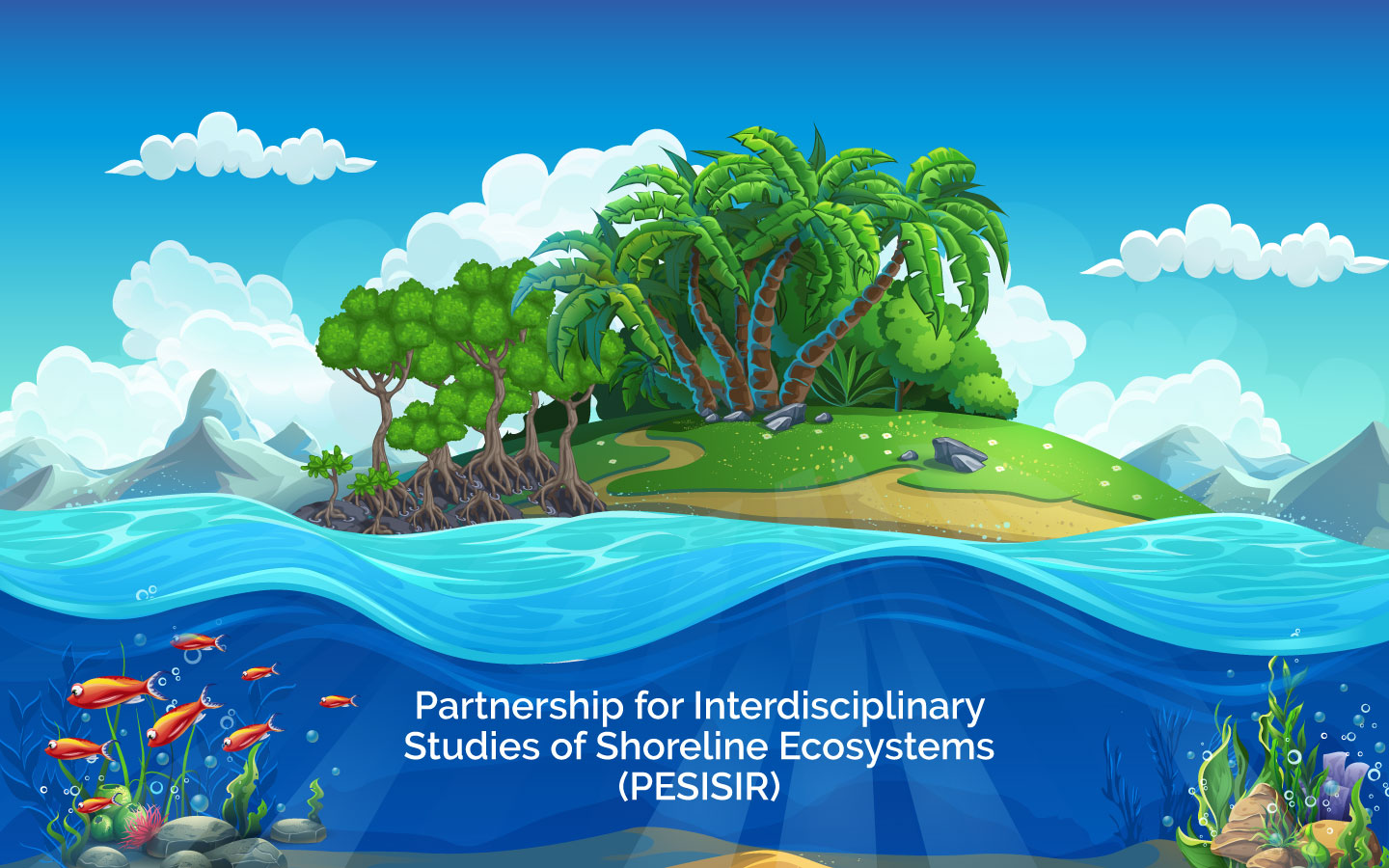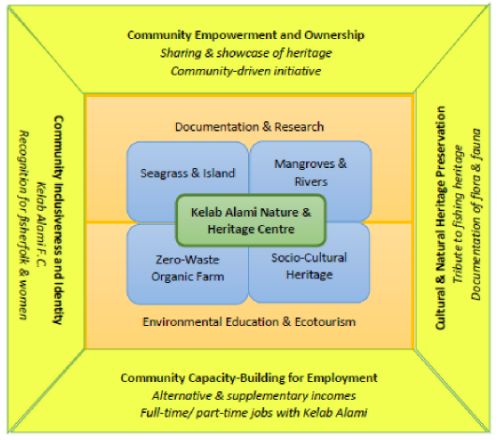
PESISIR is an Iskandar Malaysia (IM) coastal partnership envisioned to be a long-term initiative that aims to better understand IM’s coastal areas from a holistic perspective that covers ecological, social and economic elements. Ultimately, PESISIR is intended to influence policy decisions at regional, state and national levels in order to improve environmental quality and quality of life of coastal communities.
The Partnership aims to be the Green Conscience for Iskandar Malaysia in the following ways:
a. To ensure unparalleled preservation of shoreline ecosystems;
b. To allow for accurate documentation and monitoring of coastal habitats;
c. To ensure sustainable development of the coastlines’ long-term future and for its people; and
d. To develop a model partnership that can be replicated across Johor and beyond.
IRDA acknowledges the need to protect intact ecosystems to maintain ecosystem services that provide livelihoods for communities and prepare for natural disasters like flooding and tsunami. The coastline plays a vital role in contributing to continued growth of IM which has been envisioned to be a “strong and sustainable metropolis of international standing” by the year 2025. In realising this vision, sustainable development is the overarching goal that must be achieved in line with adequate protection of natural resources and preservation of cultural heritage.
Kelab Alami (KA) began as a Mukim Tanjung Kupang youth environmental club in November 2009 and focused on training local youth as habitat experts and monitors, and thereafter as ecotourism guides. In 2014, the club founders decided to close KA because of development on our seagrass and coastal areas.
Thanks to former staff of Country Garden Pacific View (CGPV) and other supporters, however, the club founders were encouraged to restart the programme in 2015 and evolved the programme to focus on capacity-building KA graduates and the wider community so that they can participate in and benefit from the changes taking place on their doorsteps.
Simple entrepreneurship efforts and skills training have since helped the community and youth to gain alternative or supplementary incomes during difficult times.
In 2016, contributions from CGPV and other sponsors allowed the club to run several workshops, ecotourism training sessions and various other programmes for the community, as well as provide seed funding for local entrepreneurship efforts.
All of these efforts have shown some success in garnering additional income for the community, and have provided useful skills that the local youth can use in future jobs or careers.
Besides learning entrepreneurial skills, KA members are also improving their English-speaking skills, and in the near future will also learn how to speak Mandarin.
KA also runs its own football club, with annual player selections, which not only encourages sportsmanship and a healthy lifestyle but also an opportunity for promising players to be recruited by professional football scouts.
One of the key programmes under Kelab Alami is engagement with local fishermen to improve their livelihoods given decreasing catch at sea. Shalan Jum’at (our co-founder) has been working with about 10 fishermen – with him functioning as a ‘middle-man’ and providing them with better rates for their seafood. Which were then sold either directly to buyers or to nearby fish stalls. This then forced other ‘middle-men’ to raise their rates for the rest of the fishermen in order to get their supplies. He also paid them in cash as soon as they handed over their catch – other middle-men tend to take 2-3 days to pay them for their harvests and the fishermen are always in need of immediate reimbursement. The finances for this effort was paid for by Shalan Jum’at and Kelab Alami.
The fishermen in Mukim Tg Kupang traditionally fish depending on their village origins. For example those from the former Tg Pelepas (now taken over by the port) focus on large income catch such as prawns and large fish. Fishermen from other areas focus on small fish or crabs. Because of reduced catch in the area, Shalan worked with the fishermen to learn and share how to make crab nets to encourage them to diversify their target species and strengthen their income base. The materials used for these nets were funded by CGPV. Shalan then provided them with these nets (at no cost to the fishermen) so that they could rely on crabs as a source of income when prawns and large fish were hard to come by.
This has helped them stabilise their earnings and a study is currently ongoing to assess the changes in their catch. Anecdotal responses have so far indicated that they are better able to cover their daily costs because they can now supplement their seasonal earnings with daily crab hauls. Fishermen who only focussed on catching crabs either got a side income from teaching others how to make crab nets, demonstrating the skills to visiting guests or making nets for other species and adding to their income with other target species. This endeavour has seen almost direct improvement to their livelihoods.
Kelab Alami has also purchased a lorry which helps the fishermen by sending excess catch to Pontian, and in future opening a fish stall to sell directly to visitors (which gives them more income than sending the fish to Pontian), as well as collecting recyclable goods from the same families for sale in Gelang Patah.
With Kelab Alami’s current focus on capacity-building the community for employment in upcoming development or in work related to the marine habitat, we are in the process of setting up a cooperative (Koperasi Alami Johor Berhad). This cooperative was registered in Sept 2016 and at the initial AGM had more than 150 people interested to become members. This interest is a spillover from the community’s familiarity with the work of Kelab Alami. By the end of April 2017, we will have a cooperative bank account and begin to formalise membership and collect funds. Once fully up and running, the main focus of the cooperative will be the Kelab Alami Nature & Heritage Centre.
Kelab Alami has been documenting and collecting samples from local natural areas since 2009. Given the changes to local habitats and increasing difficulties in maintaining traditional fishing livelihoods and practices, Kelab Alami is now working towards developing a Nature & Heritage Centre as a tribute to the natural and cultural heritage that may soon be lost. As development is inevitable, the centre could be the only tribute and/or memory of the habitats and fishing heritage that once was.
The main goal is to set up a Nature & Heritage Centre that will showcase the rich history of the area, both culturally as well as ecologically. The centre will allow Kelab Alami to continue its environmental education programmes, led by former Youth Rangers (Kelab Alami Graduates) who are now working either full-time or part-time with us. They will also continue their local knowledge, habitat and heritage research and documentation work in collaboration with our long-standing network of scientists, academics and habitat experts.
The novelty of this set up, however, is the bridging of science and local-knowledge, as well as the social sciences in a presentation of human-habitat interactions in this region. The consolidation of traditional ecological wisdom and scientific research is also rarely practiced in Malaysia. This centre, owned entirely by the cooperative, will be run and managed by Kelab Alami for the local community, and will empower the community through the realisation that their heritage and history is of great value and capacity-build the cooperative for long-term financial sustainability.
Income earned through Habitat Guided Walks and environmental education programmes for local schools and visitors will allow the community to participate in the development taking place around them in a manner that is still related to their traditional livelihoods. The community will be able to use the centre as a venue to sell local harvests, products, cuisine, craft and other products to visitors, which will further enhance income opportunities and support many fledgling entrepreneurial efforts taking place in the district. The centre will also be the crux of all of Kelab Alami’s programmes, as shown in the diagram below.

The Centre as a whole will have the ability to support multiple segments of the local community, whether they are school-leavers with more technical skills than academic, local graduates with scientific knowledge, school dropouts linked to our Kelab Alami F.C. (football club) initiative or local women and fishermen in need of supplementary incomes.
The brainchild of Shalan Jum’at, Kelab Alami Youth have been groomed to set up small businesses to earn some pocket money for their daily expenses.
Gerai Remaja Kelab Alami spawned as food stalls opened during the fasting month of 2016, the youth were taught how to run a small food business and were tasked with preparing and/or sourcing for food and drinks, managing the accounts and supplies or equipment needed and taking care of the marketing and promotion. 3 of these stalls were set up as a competition between youth groups as an incentive for them to learn. All earnings were then disbursed to the youth at the end of the month once the costs were covered. The larger equipment costs were borne by Kelab Alami.
This effort then became a daily drinks and cakes stall near the Pendas Jetty where the youth set up shop to supply light refreshments and nasi lemak to visitors, villagers and fishermen. While they had some good sales on the weekends, more stalls began to open up in the area and the youth were not satisfied with what they got. Today through the youths’ own initiative and carpentry effort, they have evolved the Gerai Remaja into an evening burger and BBQ fish stall. Open right in front of the construction entrance to Forest City, they have a broad clientele of local customers and Forest City contractors and construction workers. They are constantly improving both their stall infrastructure (built themselves from recycled wood) and their menu but have successfully garnered enough skills and experience to make the effort a success on their own initiative.
Moto Ikan is a seafood delivery service conducted by younger members of Kelab Alami on the weekends or during school holidays. These youth buy fish from the local fishermen (guided by Shalan Jum’at) and then sell them in 1kg packets door-to-door within the village. They get to keep their earnings as pocket money for school. While their regular products are flower crabs, they also sell fish that cater to the tastes of the villagers. Having the seafood delivered to their doorstep (or a phone call away) helps local people to reduce travel costs and inconvenience. The service is popular and their stocks are almost always sold out within 2-3 hours. This effort will soon evolve into food truck based sales during the weekends to maximise fishermen’s earnings and their own income – targeting the Singaporean and other visitors to the jetty. Door-to-door deliveries will still be available when phone orders are made.
Website: kelabalami.weebly.com
General Email : [email protected]
Hhabitat Walks Email: [email protected]
Facebook: www.facebook.com/KelabAlamiMukimTgKupang
Instalgram: kelabalami_
Moto Ikan on Facebook: https://www.facebook.com/moto.ikan.kelab.alami
Gerai Remaja KA on Facebook: www.facebook.com/gerai.kelab.alami
A) For Technical Agency Staff
B) For Youth / Local Champions
How do we disperse and support the human population in a rich & equitable manner without destroying the natural environment? How do we make use of nature for our spiritual, cultural and intellectual needs?
We would love to hear your ideas!
We would like to hear your ideas, suggestions, aspirations and comments on how – together – we can to improve, protect and enhance the Iskandar Malaysia (IM) coastal environment and quality of life of coastal communities. Fill out our “Ideas Submission Form” with as much information as you can provide. A member of our team will contact you for further details.